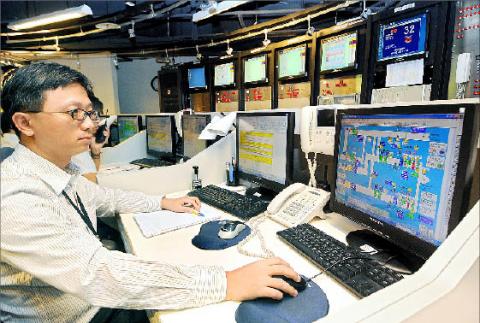Taipei 101 became the tallest building in the world to receive Leadership in Energy and Environmental Design (LEED) Platinum Certification yesterday at an award ceremony in the building’s lobby.
In cooperation with SL+A International, EcoTech International and Siemens Limited Taiwan, staff at Taipei 101 worked for more than 20 months to implement changes that would allow the building to meet the increasingly stringent certification standards.
Developed by the US Green Building Council, LEED is the most widely used green building rating system in the world. Taipei 101 achieved the platinum level certification in the Existing Buildings: Operations and Maintenance category.

Photo: Fang Pin-chao, Taipei Times
With a total floor space of 357,721m2, 90 tenants and a day-time population of more than 10,000 people, the project posed a number of challenges to implement, not to mention the NT$60 million (US$2.08 million) price-tag.
However, it was well worth it, Taipei 101 officials said.
“We started improving energy efficiency in 2007 and in the three years to 2010, we have already made that money back. From now on, we expect to save NT$36 million or US$1.2 million each year on energy costs, compared to 2007 levels” said Cathy Yang (楊文琪), vice president of the tower division of Taipei 101.
As for the wider impact of the project, green building experts said the assumption was that only newly constructed buildings could meet LEED standards, but Taipei 101’s certification could be the “lighthouse” project leading the way for other existing buildings to follow suit.
“When a world celebrity building like [Taipei] 101 achieves the highest level of certification, you know that every tall building on the planet as well as every little building on the planet is going to be looking somehow to emulate the achievement,” Rob Watson, chairman, CEO and chief scientist of EcoTech International and the “father of the LEED” certification, said yesterday.
Mark MacCracken, chairman of the US Green Building Council, said the achievement by Taipei 101 at the platinum level has taken away the excuses from other buildings around the world for not being able to do so.
“[People would say] ‘oh, we can’t do that. We’re too tall, we’re too this, we have too many tenants,’ this sort of thing — that discussion is now off the table because of this building and I think that that’s the biggest statement this building has made for the industry,” MacCracken said.

Sweeping policy changes under US Secretary of Health and Human Services Robert F. Kennedy Jr are having a chilling effect on vaccine makers as anti-vaccine rhetoric has turned into concrete changes in inoculation schedules and recommendations, investors and executives said. The administration of US President Donald Trump has in the past year upended vaccine recommendations, with the country last month ending its longstanding guidance that all children receive inoculations against flu, hepatitis A and other diseases. The unprecedented changes have led to diminished vaccine usage, hurt the investment case for some biotechs, and created a drag that would likely dent revenues and

Global semiconductor stocks advanced yesterday, as comments by Nvidia Corp chief executive officer Jensen Huang (黃仁勳) at Davos, Switzerland, helped reinforce investor enthusiasm for artificial intelligence (AI). Samsung Electronics Co gained as much as 5 percent to an all-time high, helping drive South Korea’s benchmark KOSPI above 5,000 for the first time. That came after the Philadelphia Semiconductor Index rose more than 3 percent to a fresh record on Wednesday, with a boost from Nvidia. The gains came amid broad risk-on trade after US President Donald Trump withdrew his threat of tariffs on some European nations over backing for Greenland. Huang further

CULPRITS: Factors that affected the slip included falling global crude oil prices, wait-and-see consumer attitudes due to US tariffs and a different Lunar New Year holiday schedule Taiwan’s retail sales ended a nine-year growth streak last year, slipping 0.2 percent from a year earlier as uncertainty over US tariff policies affected demand for durable goods, data released on Friday by the Ministry of Economic Affairs showed. Last year’s retail sales totaled NT$4.84 trillion (US$153.27 billion), down about NT$9.5 billion, or 0.2 percent, from 2024. Despite the decline, the figure was still the second-highest annual sales total on record. Ministry statistics department deputy head Chen Yu-fang (陳玉芳) said sales of cars, motorcycles and related products, which accounted for 17.4 percent of total retail rales last year, fell NT$68.1 billion, or

MediaTek Inc (聯發科) shares yesterday notched their best two-day rally on record, as investors flock to the Taiwanese chip designer on excitement over its tie-up with Google. The Taipei-listed stock jumped 8.59 percent, capping a two-session surge of 19 percent and closing at a fresh all-time high of NT$1,770. That extended a two-month rally on growing awareness of MediaTek’s work on Google’s tensor processing units (TPUs), which are chips used in artificial intelligence (AI) applications. It also highlights how fund managers faced with single-stock limits on their holding of market titan Taiwan Semiconductor Manufacturing Co (TSMC, 台積電) are diversifying into other AI-related firms.